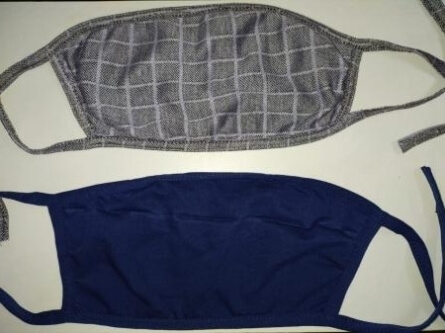Combination of cotton, silk may be best home made masks
25-April-2020

To prevent the spread of coronavirus (COVID-19) pandemic, the researchers, including one of Indian-origin, have revealed that a combination of cotton with natural silk or chiffon can effectively filter out aerosol particles.
According to the study, published in the journal ACS Nano, SARS-CoV-2, the new coronavirus that causes COVID-19, is thought to spread mainly through respiratory droplets when an infected person coughs, sneezes, speaks or breathes.
These droplets form in a wide range of sizes, but the tiniest ones, called aerosols, can easily slip through the openings between certain cloth fibres, leading some people to question whether cloth masks can actually help prevent disease.
Therefore, Supratik Guha at the University of Chicago in the US, and colleagues wanted to study the ability of common fabrics, alone or in combination, to filter out aerosols similar in size to respiratory droplets.
They used an aerosol mixing chamber to produce particles ranging from 10 nanometres to 6 micrometres in diameter.
According to the study, a fan blew the aerosol across various cloth samples at an airflow rate corresponding to a person's respiration at rest, and the research team measured the number and size of particles in the air before and after passing through the fabric.
The researchers found that one layer of a tightly woven cotton sheet combined with two layers of polyester-spandex chiffon -- a sheer fabric often used in evening gowns -- filtered out the most aerosol particles (80-99 per cent, depending on particle size), with performance close to that of N95 mask material.
Substituting the chiffon with natural silk or flannel, or simply using a cotton quilt with cotton-polyester batting, produced similar results.
The researchers said that tightly woven fabrics, such as cotton, can act as a mechanical barrier to particles, whereas fabrics that hold a static charge, like certain types of chiffon and natural silk, serve as an electrostatic barrier. However, they cautioned that even a one per cent gap reduced the filtering efficiency of all masks by half or more, emphasising the importance of a properly fitted mask.
"Our studies also imply that gaps can result in over a 60 per cent decrease in the filtration efficiency, implying the need for future cloth mask design studies to take into account issues of "fit" and leakage, while allowing the exhaled air to vent efficiently," the authors noted. IANS
Bajrang Dal Appeals to Ban Oyo Check-Ins for Unmarried Couples in Bengaluru
Heavy Rains Predicted In Five TN Districts On January 11
Cold Wave Grips Rajasthan: Fatehpur Hits 1.1°C, Nagaur 1.7°C
Actor Ajith Kumar Escapes Unharmed After Crash During 24H Dubai Practice
32 Dead As 7.1 Magnitude Earthquake Strikes Nepal-Tibet Border









